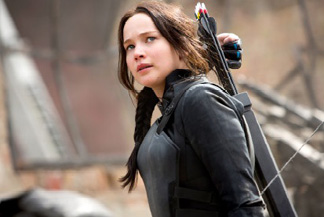Movie Review - The Hunger Games: Mockingjay Part 1
By Matthew Huntley
November 26, 2014
BoxOfficeProphets.com

At this point in the saga, I did not expect The Hunger Games to reach any further than what was required of it to hold my attention. That’s why I was so surprised to find Mockingjay – Part 1, the penultimate chapter of the franchise, doing just that. It works on more than just an entertainment and action-oriented level; it generates real drama, real emotion and real tension, functioning not only as a bridge to the finale, but as a fully realized movie with characters whose lives and situations matter to us. This is what we hope for with any story, but because we don’t expect it as much from such a grandiose and popular enterprise as The Hunger Games, which already has a large and loyal fan base, it’s perhaps more impressive.
By now, you probably know The Hunger Games takes place in a grim and post-apocalyptic future, where the world’s last remaining country, Panem, has been divided into 12 districts and is ruled by an autocratic government known as the Capitol. The Hunger Games, as they’re called, are an annual event in which two members from each district are chosen at random to kill the others, which is the Capitol’s means of keep its citizens under control. This system was working fine for 73 years until Katniss Everdeen (Jennifer Lawrence) and Peeta Mellark (Josh Hutcherson) stepped in. At the end of the 74th Hunger Games, they both emerged as victors and this aberration lit the match for a potential uprising, which, following the events of Catching Fire, is now in full swing.
The underground members of District 13, long thought to be extinct, are taking action to unite all the districts and start a revolution that would overthrow the Capitol. District 13’s president, Alma Coin (Julianne Moore), and Plutarch Heavensbee (Philip Seymour Hoffman), the Game’s former designer, beseech Katniss to be the rebellion’s Mockingjay, or the face of hope and freedom, since it was her actions that proved the government’s control wasn’t indestructible.
Along with her trusted mentor Haymitch (Woody Harrelson) and chaperone Effie (Elizabeth Banks), as well as a new camera crew, the rebellion sets out to mold Katniss into a brave, graceful and compassionate warrior who’s willing to stand up for the people and wage war against the Capitol and President Snow (Donald Sutherland). Her only demands are that her fellow victors, including Peeta, who are now prisoners of the Capitol, be rescued and given a full pardon. Peeta has been made a puppet of the government and his broadcasted interviews with Caesar Flickerman (Stanley Tucci) are the Capitol’s own form of propaganda in which he insists Katniss turn herself in and cease fueling this civil war.
The themes and social commentary of The Hunger Games are mostly obvious, and Mockingjay – Part 1 has its fair share of convenient plot devices, as when Beetee (Jeffrey Wright), the engineering genius introduced in the last film, seems to have every resource at his disposal to design and manufacture special weapons for Katniss and Gale (Liam Hemsworth). Such instances feel as though they were yanked right out of a James Bond picture, with Beetee playing the role of Q. And while all of these elements come together well enough to satiate our need for excitement and escapism, it’s the movie’s patience, emotion and character reflection that really make it come alive.
Consider the scene when Katniss visits her former home in District 12 and sees for herself the devastation wreaked by the Capitol’s recent bombings. We might expect such a moment to be short-lived and simply function to provide her character the motivation to fight and take on the role of Mockingjay. And while it does do that, director Francis Lawrence lets it play out naturally and we really take in what Katniss is feeling. It helps that Jennifer Lawrence is such a superb actress, able to convey raw despair so effortlessly.
Another effective sequence takes place when Katniss and Gale go hunting in the woods and she ponders whether or not she should shoot a deer. Afterward, she and Gale just sit by a river and contemplate, holding each other. It’s moments like these that give the movie weight because we gain a sense of what the characters must bear.
Just as The Deathly Hallows – Part 1 did for Harry Potter, Mockingjay – Part 1 allows The Hunger Games to cross an important threshold. It was never a happy or fanciful series to begin with, but up until now, we might have approached it as just another sci-fi action-adventure saga. Now it feels deeper and more relevant. I have a feeling many fans won’t find it as traditionally “entertaining” as its predecessors, but they shouldn’t see it as the franchise losing anything, but rather gaining more profundity. I wouldn’t go so far as to say the movie gets us to think critically about moral issues such as tyranny, class systems and violence, but we now see and feel the ramifications of such things, and so our emotional investment in the story is there. Now if Mockingjay – Part 2 can go even further and actually discuss these topics intelligently so that we’re inclined to deliberate them afterward, and not just fall back on an action climax like we expect it will, that’d be really impressive.